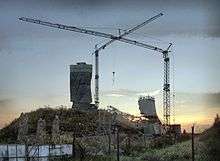Christ the King (Świebodzin)
Coordinates: 52°14′12″N 15°32′48″E / 52.236738°N 15.546552°E
| Pomnik Chrystusa Króla Christ the King | |
|---|---|
|
The statue in April 2011 | |
| Basic information | |
| Location | Świebodzin, Poland |
| Architectural description | |
| Architect(s) | Mirosław Kazimierz Patecki |
| Architectural type | Statue |
| Groundbreaking | 29 September 2006 |
| Specifications | |
| Height (max) | 33 metres (108 ft) |
| Materials | Concrete |

Christ the King (Polish: Pomnik Chrystusa Króla[lower-alpha 1], lit. Monument of Christ the King) is an Art Deco statue of Jesus Christ in Świebodzin, western Poland, completed on 6 November 2010. The figure is 33 metres (108 ft) tall,[1] the crown is 3 metres (9.8 ft) tall,[2] and along with its mound, it reaches 52.5 metres (172 ft)[3] overall. It took five years in total to construct and cost around $1.5 million to build, which was collected from donations of the 21,000 residents of the town.[2] The project was conceived and led by Sylwester Zawadzki, a retired Polish priest.[4] It is the tallest statue of Jesus in the world.[4]
Characteristics
The statue was built on a 16.5 metres (54 ft) embankment of stones and rubble.[3] Christ the King has a height of 33 metres (108 ft), symbolising a traditional belief that Jesus' age at his death was 33.[1] The Crown of the temple is 3.5 metres (11 ft) in diameter and 2 metres (6.6 ft) in height, and the whole is gilded. It weighs 440 tons. The head alone is 4.5 metres (15 ft) tall and weighs 15 tons. Each hand is 6 metres (20 ft) in length and the distance between the ends of the fingers is 24 metres (79 ft). It is composed of concrete and fibreglass.[1][3] It is 3 metres (9.8 ft) taller than the better known statue of Christ the Redeemer in Rio de Janeiro, standing at 30.1 metres (99 ft) tall without its pedestal.
Design
The designs for various elements of the statue were produced by a number of individuals; the sculpture design was primarily produced by Mirosław Kazimierz Patecki with the technical design aspect being undertaken by Assoc. Jakub Marcinowski and Assoc. Mikołaj Kłapeć, both of whom are employees of the University of Zielona Gora. Meanwhile, elements of the clothing and the arms of the statue were designed by Tomasz Stafiniak and Krzysztof Nawojski (the latter being of the town of Świebodzin) respectively. Another resident of Świebodzin, Marian Wybraniec, was responsible for the design of the foundations upon which the statue was constructed.
The construction work was undertaken by staff employed by the Sanctuary of Divine Mercy in Świebodzin and included welders, locksmiths and mechanics.
Construction
On 29 September 2006, the city council of Świebodzin passed a resolution on the establishment of Christ the King.[5] The President (under the authority of the board) along with the mayor spoke to the Bishop of Zielona Góra-Gorzów Diocese. State officials also temporarily halted the project due to safety concerns. With funding from local people and as far away as Canada, the statue was completed on November 6, 2010 and now takes its place as the Largest Statue of Jesus Christ according to the Guinness Book of World Records.[6]
See also
Notes
- ↑ Pronounced [ˈpɔmɲik ɣrɨsˈtusa ˈkrula].
References
- 1 2 3 Jesus rises from cabbage field, Irish Times, November 5, 2010
- 1 2 Milena Rachid Chehab (29 January 2009). "Rio wschodu" (in Polish). Wydawnictwo "Przekrój" sp. z o.o. Archived from the original on October 27, 2010. Retrieved 25 January 2012.
- 1 2 3 PAP (21 November 2010). ""Chrystus Królem Wszechświata". Poświęcono figurę w Świebodzinie" (in Polish). Gazeta.pl. Wiadomości. Retrieved 25 January 2012.
- 1 2 "Polish Town Erects World's Largest Jesus Statue". Christian Post. 2010-11-06. Retrieved 2010-11-06.
- ↑ ŚWIEBODZIN: Chrystus Król zapanuje nad Świebodzinem dopiero wiosną - 11 grudnia 2007
- ↑ Tallest Jesus statue - Christ the King Monument sets world record. World Record Academy.com
External links
| Wikimedia Commons has media related to Christ the King (statue). |
- The official Website of the Christ the King Statue (Polish, German, English, Russian)
- Aerial 360 Panorama of the Statue
